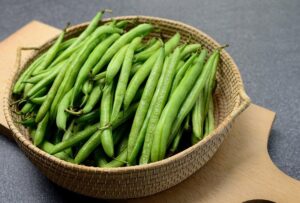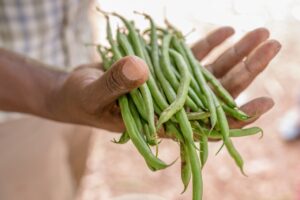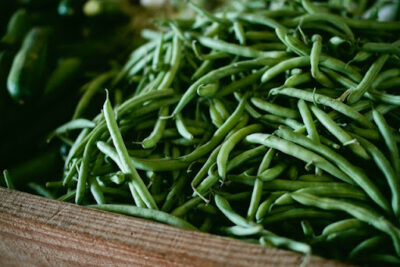Curious about the dietary options for your bearded dragon? Wondering if green beans make a suitable addition to their menu? Let’s dive into the world of reptile nutrition and explore the question: Can bearded dragons eat green beans?”
Yes, bearded dragons can eat green beans. Green beans are a nutritious addition to their diet, providing fiber, vitamins, and minerals. However, it’s essential to offer them in moderation and ensure they’re prepared properly. Be sure to remove any seasoning or additives before serving them to your bearded dragon.
Additionally, variety is key in their diet, so green beans should be part of a balanced meal plan along with other vegetables, fruits, and proteins suitable for bearded dragons. Always monitor your pet’s intake and consult a veterinarian for specific dietary recommendations.
Can bearded dragons eat green beans?

Yes, bearded dragons can eat green beans, but they should be fed to them in moderation. Green beans are a good source of fiber, vitamins, and minerals, which can be beneficial for your pet’s diet. However, they should not make up the majority of their diet.
Bearded dragons are omnivores, meaning they eat both plant and animal matter. Their diet should consist of a variety of vegetables, fruits, and insects to ensure they receive all the necessary nutrients. Green beans can be included as part of this variety, but they should be chopped into small, manageable pieces to prevent choking, and they should be offered alongside other suitable foods.
It’s also important to note that any food given to a bearded dragon should be free from pesticides and other harmful chemicals. Additionally, if you’re feeding your bearded dragon green beans for the first time, monitor their reaction to ensure they don’t have any adverse effects, such as digestive issues. As with any new food, it’s best to introduce it gradually.
Health Benefits of Green Beans for Bearded Dragons
Green beans can offer several health benefits to bearded dragons when included as part of a balanced diet:
- Nutrient Content: Green beans are rich in various vitamins and minerals, including vitamin C, vitamin K, vitamin A, manganese, and fiber. These nutrients are essential for the overall health and well-being of bearded dragons, supporting their immune system, bone health, and digestion.
- Hydration: Green beans have a high water content, which can help keep bearded dragons hydrated, especially if they are not drinking enough water from their water dish. Proper hydration is crucial for maintaining healthy organ function and preventing dehydration-related issues.
- Fiber: The fiber content in green beans can aid in digestion and help prevent constipation in bearded dragons. Fiber promotes regular bowel movements and supports a healthy gastrointestinal tract.
- Low in Oxalates: Green beans are relatively low in oxalates compared to some other vegetables, such as spinach and kale. Oxalates can bind to calcium and prevent its absorption, potentially leading to calcium deficiency in reptiles. Choosing low-oxalate foods like green beans can help ensure proper calcium utilization in bearded dragons.
- Weight Management: Green beans are low in calories and fat, making them a suitable option for bearded dragons that need to manage their weight or maintain a healthy weight. Feeding them low-calorie, nutrient-rich foods like green beans can help prevent obesity-related health issues.
- Variety in Diet: Offering a variety of vegetables, including green beans, helps prevent dietary monotony and ensures that bearded dragons receive a diverse range of nutrients. A varied diet can support overall health and prevent nutrient deficiencies.
- Enrichment: Introducing new foods like green beans can provide mental stimulation and enrichment for bearded dragons. Offering a variety of textures, flavors, and colors encourages natural foraging behaviors and promotes overall well-being.
While green beans can provide numerous health benefits to bearded dragons, it’s essential to offer them as part of a balanced and varied diet. Be sure to consult with a veterinarian or reptile nutritionist for specific dietary recommendations tailored to your pet’s individual needs.
Additionally, always wash vegetables thoroughly and remove any pesticides or harmful chemicals before feeding them to your bearded dragon.
Risks and Concerns of feeding bearded dragon green beans

While green beans can offer health benefits when fed to bearded dragons in moderation, there are also some risks and concerns associated with including them in their diet:
- Calcium to Phosphorus Ratio: Green beans have a higher phosphorus content compared to calcium. A proper calcium to phosphorus ratio is essential for bearded dragons to maintain healthy bones and prevent metabolic bone disease (MBD). Feeding foods with an imbalanced ratio, such as those high in phosphorus, can interfere with calcium absorption and contribute to MBD if not balanced with adequate calcium sources.
- Oxalates: While green beans are relatively low in oxalates compared to some other vegetables, they still contain moderate levels. Oxalates can bind to calcium, forming calcium oxalate crystals, which may impair calcium absorption and lead to metabolic issues, including kidney stones or gout, especially if fed in large quantities over time.
- Digestive Upset: Some bearded dragons may have difficulty digesting green beans, particularly if they are not accustomed to consuming them or if they are fed in large quantities. Green beans contain fiber, which can be beneficial for digestion but may also cause gastrointestinal upset, such as bloating, gas, or diarrhea, if introduced too quickly or fed excessively.
- Pesticides and Chemical Residues: Green beans, like other vegetables, may contain pesticide residues or harmful chemicals if not properly washed or sourced from organic sources. These residues can be toxic to bearded dragons and may lead to health issues if ingested. It’s essential to wash vegetables thoroughly and consider using organic or pesticide-free options whenever possible.
- Choking Hazard: Whole or large pieces of green beans can pose a choking hazard, particularly for younger or smaller bearded dragons. It’s crucial to chop green beans into small, manageable pieces to reduce the risk of choking and ensure safe consumption.
- Nutritional Imbalance: Feeding green beans exclusively or as a significant portion of the diet can lead to a nutritional imbalance. Bearded dragons require a diverse diet that includes a variety of vegetables, fruits, insects, and occasional treats to meet their nutritional needs. Over-reliance on any single food item, including green beans, may result in deficiencies or excesses of certain nutrients.
To mitigate these risks and concerns, it’s important to feed green beans to bearded dragons in moderation as part of a balanced and varied diet. Additionally, always monitor your pet for any signs of digestive upset or other health issues, and consult with a veterinarian or reptile specialist for personalized dietary recommendations and guidance.
How to Feed Green Beans to Bearded Dragons
Feeding green beans to bearded dragons requires some preparation to ensure they are offered safely and in a manner that maximizes nutritional benefits.
Here’s a step-by-step guide on how to feed green beans to your bearded dragon:
- Select Fresh Green Beans: Choose fresh, crisp green beans from a reputable source. Look for beans that are firm, vibrant green in color, and free from signs of wilting or mold.
- Wash Thoroughly: Rinse the green beans under cold water to remove any dirt, pesticides, or chemical residues. Washing helps ensure that the beans are clean and safe for consumption.
- Trim Ends and Remove Strings: Trim off the stem ends and any attached strings or tough fibers from the sides of the green beans. These parts can be difficult for bearded dragons to chew and digest.
- Chop into Bite-Sized Pieces: Cut the green beans into small, bite-sized pieces appropriate for your bearded dragon’s size. This helps prevent choking and makes it easier for them to consume and digest the beans.
- Offer as Part of Balanced Diet: Incorporate chopped green beans into your bearded dragon’s regular diet as part of a balanced and varied meal plan. Green beans should not make up the majority of their diet but can be offered alongside other vegetables, fruits, and insects to provide nutritional diversity.
- Monitor Consumption: Introduce green beans gradually into your bearded dragon’s diet to observe their reaction and ensure they tolerate them well. Monitor their appetite, behavior, and bowel movements to detect any signs of digestive upset or adverse reactions.
- Rotate with Other Foods: Rotate green beans with other vegetables and greens to provide a diverse array of nutrients and flavors. This helps prevent dietary monotony and ensures your bearded dragon receives a well-rounded diet.
- Remove Uneaten Portions: Bearded dragons may not eat all the green beans you offer them at once. Remove any uneaten portions from their enclosure after feeding to prevent spoilage and maintain cleanliness.
- Offer Variety: While green beans can be a nutritious addition to your bearded dragon’s diet, it’s essential to offer a variety of foods to meet their nutritional needs fully. Include a mix of vegetables, fruits, insects, and occasional treats to ensure a balanced and satisfying diet.
By following these steps, you can safely and effectively incorporate green beans into your bearded dragon’s diet, providing them with essential nutrients and variety for optimal health and well-being.
Conclusion
Can bearded dragons eat green beans? Yes, they can. Green beans can be a nutritious addition to a bearded dragon’s diet when offered in moderation as part of a balanced meal plan. However, it’s essential to wash, chop, and introduce them gradually to monitor for any adverse reactions.
As with any food, variety is key, so rotate green beans with other vegetables and ensure a diverse diet to meet your pet’s nutritional needs.

